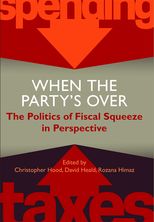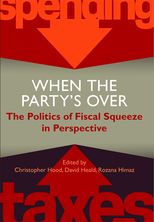When the Party’s Over: The Politics of Fiscal Squeeze in Perspective
When the Party’s Over: The Politics of Fiscal Squeeze in Perspective
Gladstone Professor of Government
Professor of Accountancy
Lecturer in Economics
Cite
Abstract
This book develops a framework for analysing the politics of ‘fiscal squeeze,’ defined as political effort to cut spending and increase taxes to correct the public finances—a theme which has dominated the politics of many of the world’s democracies in the 2010s. The book poses three questions about the politics of fiscal squeeze in democracies, namely what if anything is special about the politics of austerity or retrenchment, whether fiscal squeeze presents credit-claiming opportunities or severe blame-avoidance challenges to elected governments, and whether fiscal squeezes are highly consequential in their effects. To explore those questions, it examines nine cases of fiscal squeeze in democracies in different times and places, ranging from the early United States in the 1830s/40s (when half of the states then in the Union defaulted) to the squeeze following the 2001 Argentinian default and devaluation. The cases explored are sufficiently far back in time for an assessment of their consequences to be made and the analysis combines systematic quantitative comparison with in-depth qualitative study of each case by leading country experts. The analysis shows there is no single set of preconditions for fiscal squeeze and that the political consequences of such squeezes—for example, in who got political blame or credit and the longer-term effects on politics and government—were highly variable in these nine cases. The book argues that ‘how to do it’ approaches to fiscal squeeze in democracies, based on apparently successful cases, often fail to take into account profound differences in circumstances.
-
Front Matter
-
Part I Introduction
-
Part II Case Studies
-
3
Managing Fiscal Squeeze after the United States’ Panic of 1837
Alasdair Roberts
-
4
The UK Geddes Axe of the 1920s in Perspective
Christopher Hood andRozana Himaz
-
5
Carpe Diem! New Zealand’s Fiscal Squeeze, 1990–1993: Economic Problems, Welfare Reform and Political Consequences
Robert Gregory andChris Eichbaum
-
6
Fiscal Squeeze in Dutch Municipalities in the 1980s: Cutback Measures and Public Management Reforms
Walter Kickert
-
7
Repeating History: Fiscal Squeeze in Two Recessions in Ireland
Niamh Hardiman
-
8
Fiscal Squeeze in Germany: Drifting Away from the Politics of the Switching Yard?
Martin Lodge andKai Wegrich
-
9
Fiscal Squeeze in Sweden, 1990–1997: The Causes, the Measures, and their Short- and Long-Run Effects
Anders Lindbom
-
10
A Perfect Storm in Reverse: The 1994–1997 Program Review in Canada
Donald J. Savoie
-
11
Budget Politics in Really Hard Times: Fiscal Squeeze During and After Argentina’s Great Depression
Sebastián Dellepiane-Avellaneda
-
3
Managing Fiscal Squeeze after the United States’ Panic of 1837
-
Part III Conclusion
-
End Matter
Sign in
Personal account
- Sign in with email/username & password
- Get email alerts
- Save searches
- Purchase content
- Activate your purchase/trial code
Institutional access
-
Sign in through your institution
- Sign in with a library card Sign in with username/password Recommend to your librarian
Institutional account management
Sign in as administratorPurchase
Our books are available by subscription or purchase to libraries and institutions.
Purchasing information| Month: | Total Views: |
|---|---|
| October 2022 | 5 |
| October 2022 | 1 |
| November 2022 | 1 |
| December 2022 | 1 |
| January 2023 | 1 |
| March 2023 | 1 |
| March 2023 | 3 |
| June 2023 | 3 |
| July 2023 | 4 |
| July 2023 | 2 |
| July 2023 | 2 |
| October 2023 | 3 |
| October 2023 | 1 |
| December 2023 | 2 |
| March 2024 | 1 |




Get help with access
Institutional access
Access to content on Oxford Academic is often provided through institutional subscriptions and purchases. If you are a member of an institution with an active account, you may be able to access content in one of the following ways:
IP based access
Typically, access is provided across an institutional network to a range of IP addresses. This authentication occurs automatically, and it is not possible to sign out of an IP authenticated account.
Sign in through your institution
Choose this option to get remote access when outside your institution. Shibboleth/Open Athens technology is used to provide single sign-on between your institution’s website and Oxford Academic.
If your institution is not listed or you cannot sign in to your institution’s website, please contact your librarian or administrator.
Sign in with a library card
Enter your library card number to sign in. If you cannot sign in, please contact your librarian.
Society Members
Society member access to a journal is achieved in one of the following ways:
Sign in through society site
Many societies offer single sign-on between the society website and Oxford Academic. If you see ‘Sign in through society site’ in the sign in pane within a journal:
If you do not have a society account or have forgotten your username or password, please contact your society.
Sign in using a personal account
Some societies use Oxford Academic personal accounts to provide access to their members. See below.
Personal account
A personal account can be used to get email alerts, save searches, purchase content, and activate subscriptions.
Some societies use Oxford Academic personal accounts to provide access to their members.
Viewing your signed in accounts
Click the account icon in the top right to:
Signed in but can't access content
Oxford Academic is home to a wide variety of products. The institutional subscription may not cover the content that you are trying to access. If you believe you should have access to that content, please contact your librarian.
Institutional account management
For librarians and administrators, your personal account also provides access to institutional account management. Here you will find options to view and activate subscriptions, manage institutional settings and access options, access usage statistics, and more.